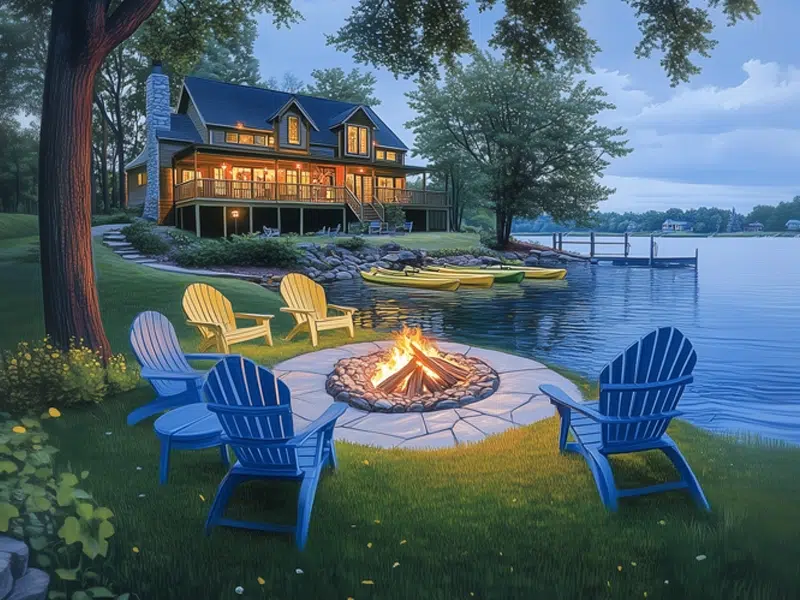Current Short-Term Rental Laws and Airbnb Regulations in Nevada
Short-term rentals are a significant part of the tourism economy in Nevada, especially in cities like Las Vegas and Reno. To address the rapid growth of platforms such as Airbnb and Vrbo, the Nevada enacted Assembly Bill 363 (AB363) in 2021, mandating local governments to establish regulations for short-term rentals setting baseline requirements. Local jurisdictions have since implemented their own ordinances to balance the economic benefits of tourism with community interests.
If you have questions about short-term rentals in Nevada, contact Proper Insurance. Our agents are experts in the vacation rental industry. Call 888-631-6680 today.
Unsure if your insurance meets the needs of short-term rental requirements? Many policies leave gaps that could lead to costly claims, and research shows that 90% of short-term rental owners are unknowingly misinsured. Schedule a quick, free 15-minute consultation can reveal hidden gaps in coverage, giving you peace of mind and confidence in the insurance protection for your rental business.

Nevada Short-Term Rental Regulations
Vacation Rental Laws in Nevada
Nevada’s Assembly Bill 363 (AB363), enacted in 2021, establishes statewide regulations for short-term rentals, Airbnb, Vrbo and direct bookings. The bill mandates that counties and cities with populations of 25,000 or more implement ordinances governing these rentals, ensuring compliance with specific standards.
AB363 includes:
- Permitting and Licensing: Property owners must obtain proper authorization to operate short-term rentals, adhering to local regulations.
- Taxation: Short-term rentals are subject to the same lodging taxes as hotels and resorts.
- Operational Standards: The bill sets forth requirements such as the duration of minimum stay, occupancy limits, and safety standards in effort to maintain community welfare.
AB363 aims to balance the economic benefits of short-term rentals with the need to preserve neighborhood integrity and ensure guest safety. It provides a framework for local governments to regulate these rentals effectively.
Airbnb Laws in Clark County, Nevada
Apartments Are Not Eligible for STR Licenses
The Nevada Legislature passed Assembly Bill 363 (AB363) in May 2021, mandating rules that Nevada short-term rentals in Nevada must follow for the protection and safety of guests staying in these homes. Find more information on short-term rentals in Clark County, NV or get answers to Clark County Short-Term Rental FAQs.
The following regulations are in place in Clark County:
- Business License: A business license is mandatory for operating or advertising short-term rentals for 30 consecutive days or less.
- Application Process: Licenses are issued through a Random Number Generator Selection Process, open annually. Check Clark County’s website for STR application updates and info or view their helpful Clark County rental application checklist.
- Licensing Cap: A 1% cap on licenses in unincorporated Clark County communities with area restrictions. Read more about Clark County’s STR licensing limits.
- Insurance Requirements: To operate, hosts must hold a valid rental license with specialized short-term rental insurance. Liability must cover $500,000 for bodily injury and property damage. Clark County Code 7.100.230.
- While $500,000 is the legal suggestion, it is recommended by industry experts to carry $1M in liability coverage at your short-term rental. Explore the most comprehensive short-term rental insurance policy on the market.
- Occupancy Restrictions: Two people per room or 10 people per residential unit.
- Dwelling Restrictions: RVs, mobile homes, apartment buildings, and apartments in Clark County are ineligible for short-term rental licenses. Multi-family dwelling vacation units are limited to 10% of units for STR use. Condos are allowed if they meet the eligibility requirements.
- Zoning: A 1,000-foot distance is required between licensed short-term rentals and STRs must be at least 2,500 feet away from any resort hotels or casinos.
- Point of Contact: A representative from the rental unit must be available 24/7 for guests and respond to any problems within 30 minutes.
- Fees & Fines: Owners will pay annual fees depending on the number of bedrooms their STR property has. Violations can result in fines ranging from $1,000 to $10,000 per day for unlicensed operations.
- Taxes: STR owners in unincorporated Clark County are required to collect a 10% to 13.38% Transient Lodging Tax from guests and remit this fee as part of Transient Lodging Monthly Tax Returns.
- Minimum Stay: Guests must stay at least two nights for each reservation.
- Parking: On-site parking must be used before street parking.
- Parties: Not allowed.
- Noise & Quiet Hours: Noise restrictions apply, with quiet hours being from 10 p.m. to 7 a.m. Radios, stereos, speakers, and musical instruments shall be used only inside enclosed short-term rental units. There is a 10PM curfew for any outdoor amenities including pools, spas, and firepits.
- Short-term rentals may be prohibited in certain Clark County townships.
Short-Term Rental Laws in Henderson, Nevada
Airbnb Laws Effective July 1, 2022
The City of Henderson reviewed the State of Nevada Assembly Bill 363 June of 2021 and made necessary revisions to the City of Henderson Short-Term Vacation Rental Ordinance. Most provisions of the Bill became effective July 1, 2022. Some provisions include:
- All short-term rentals must have a noise management plan, including items like noise monitoring equipment located both inside and outside
- All registrants must obtain a State of Nevada business license
- Each property owner is limited to a maximum of 5 registrations per State of Nevada business license held by that owner
- Hosting platform requirements such as including the City issued registration number to be listed on all platform listings
- A certificate of insurance indicating that the property is used as a short-term rental and carries general liability coverage with policy limits of not less than $1 million per occurrence
Continue to Section 19.9.4.F – Short-Term Vacation Rental if you are interested in reading the entire ordinance.
Las Vegas, Nevada, Vacation Rental Home Laws
Vegas Airbnbs Must Be Owner-Occupied During Rentals
The City of Las Vegas has implemented specific short-term rental regulations to uphold community standards and promote responsible hosting. These Las Vegas Short-Term Rental and Airbnb Laws address taxation, occupancy limits, zoning, noise and more, or view this brief Vegas STR Owner Overview.
STR laws for the City of Las Vegas, Nevada, include:
- Licensing: All STRs, Airbnbs, Vrbos, and vacation rental homes in Vegas must be properly licensed and insured in accordance with Clark County and Nevada state guidelines. Apply for a short-term rental license in Las Vegas.
- Owner Occupancy: The property must be the primary residence for the owner. Additionally, the property must be owner-occupied during each day of a rental, including use of a bedroom or another room intended for sleeping. Exceptions to leaving the property include employment and personal/household errands. This owner-occupancy clause is a specific requirement not necessarily mirrored in all areas of Clark County.
- Zoning: Short-term rentals in the City of Las Vegas must be 1,000 feet away from other licensed short-term rentals and 2,500 feet from resort hotels and casinos. No commercial events are permitted.
- Inspections Required: Specific Vegas STR inspection requirements are needed for proper licensure.
- Maximum Occupancy: Las Vegas short-term rentals may not have more than 16 occupants at any time. View the details of Las Vegas short-term rental occupancy laws.
- Point of Contact: An owner, employee, or agent of the dwelling must be available for contact and a 2-hour response period in relation to guest activity or behavior.
- Taxes: Units within city limits are subject to a tax ranging from 13% to 13.38%
- Noise: Noise from a sound device, television, or musical instrument from the property that can be heard 50 feet away violates Las Vegas Municipal Code.
- More Information: Continue to the Short-Term Rental Application page to learn more.
Failure to comply with Airbnb laws can result in fines for Las Vegas hosts and property owners. In 2024, a homeowner faced a $180,000 fine for operating an illegal short-term rental, highlighting the importance of adhering to local regulations and laws.
If you’d like to verify that your insurance meets the requirements of short-term renting in your area, call 888-631-6680.
Washoe County, Nevada STR Laws
Airbnb Laws Revised July 2022 – Includes Application and Permit Ordinance
Washoe County only requires permits for properties located in Unincorporated Washoe County. Washoe County Planning and Building Department DOES NOT have jurisdiction over the City of Reno and the City of Sparks.
The county has outlined three permit tiers dependent on the occupancy of your property. When applying for a short-term rental permit, owners are required to submit the following:
- Short-term rental application
- Site plan
- Floor plan
- Certificate of insurance identifying the property as a rental, with a minimum of $500,000 liability coverage per occurrence
- Property tax payment
- Copy of educational materials
- Parking pass or proof of parking space assignment for multi-unit short-term rentals
For more information, visit the Washoe County’s short-term rental regulations page.
Upgrade Your Short-Term Rental Insurance
Interested in a policy to protect you and your business from liability and damage claims? Proper Insurance is the nation’s leading short-term rental insurance provider, protecting homes in all 50 states and replacing inadequate Homeowners/Landlord policies.
Their comprehensive coverage meets or exceeds standard short-term rental requirements with $1M Commercial Liability (CGL) and unmatched protection for your property and revenue. Additional custom coverages include guest-caused theft/damage, amenity liability (bikes, kayaks, hot tub, etc.), bed bugs, fleas, squatters, and more.
Please note: The information provided is intended as a guide and may not be comprehensive or current. Regulations may change and could vary by area or situation. Always consult local authorities or a legal professional to ensure you have the most accurate information for your short-term rental property.




